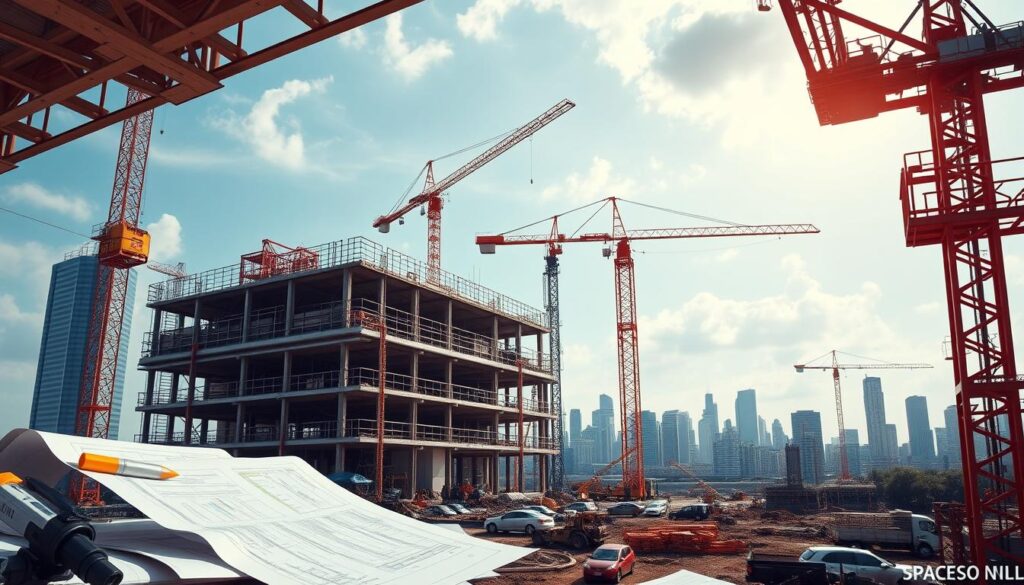Ground up construction financing is a crucial aspect of the construction industry, especially with the demand for new construction projects on the rise, according to the National Association of Home Builders. Construction loan rates and construction financing options are essential considerations for developers and contractors. With the right financing, construction projects can be completed efficiently and effectively.
Understanding construction loan rates and construction financing options is vital for making informed decisions. The current market trends indicate a growing need for new construction projects, making ground up construction financing a key factor in the industry’s growth.
Key Takeaways
- Ground up construction financing is a critical component of the construction industry
- Construction loan rates and construction financing options must be carefully considered
- The demand for new construction projects is increasing
- Understanding construction financing is essential for making informed decisions
- Construction loan rates and options can impact project efficiency and effectiveness
- Ground up construction financing is a key factor in the industry’s growth
Understanding Ground Up Construction Financing
Ground up construction financing is a complex process that involves various stakeholders and requires careful planning. One of the key factors in determining the success of a ground up construction project is construction project management. A study by the Construction Financial Management Association found that effective construction project management is critical in controlling ground up construction costs and ensuring the project’s overall success.
What Is Ground Up Construction?
Ground up construction refers to the process of building a project from the ground up, starting with raw land and ending with a completed structure. This type of construction requires significant planning, resources, and financing.
How Construction Financing Differs from Traditional Loans
Construction financing differs from traditional loans in that it is specifically designed to meet the unique needs of a construction project. Construction loans typically have shorter repayment terms and are often structured to provide funds as needed throughout the construction process.
Key Players in the Construction Financing Process
The key players in the construction financing process include:
- Lenders: Provide the necessary funding for the project
- Contractors: Responsible for the actual construction of the project
- Project managers: Oversee the construction process and ensure the project is completed on time and within budget
Types of Ground Up Construction Loans Available
When it comes to ground up construction financing, there are several options available. Understanding the different types of loans can help you navigate the construction loan application process and choose the best option for your project. The Federal Reserve reports that construction loan application processes can be complex and time-consuming, making it essential to understand the different construction financing options available.
The most common types of ground up construction loans include:
- Construction-to-permanent loans: These loans combine the construction loan and permanent financing into one loan.
- Construction-only loans: These loans provide funding for the construction phase only, and a separate loan is needed for permanent financing.
- Renovation loans: These loans are used for renovating or rehabbing an existing property.
Each type of loan has its benefits and drawbacks. It’s essential to consider factors such as interest rates, repayment terms, and fees when selecting a construction financing option. By understanding the different types of ground up construction loans available, you can make an informed decision and navigate the construction loan application process with confidence.
Benefits of Specialized Construction Financing
Specialized construction financing offers numerous benefits to construction projects, including flexible draw schedules and interest-only payment options. These benefits can help construction projects stay on track and within budget. According to a survey by the National Association of Home Builders, specialized construction financing can provide significant benefits, including reduced interest rates and customized repayment terms.
Flexible Draw Schedules
Flexible draw schedules allow construction projects to access funds as needed, rather than receiving a lump sum at the beginning of the project. This can help manage construction loan rates and ensure that the project stays within budget. Effective construction project management is crucial in utilizing these flexible draw schedules to the project’s advantage.
Interest-Only Payment Options
Interest-only payment options can help reduce the monthly payments during the construction phase, allowing the project to conserve cash flow. This can be particularly beneficial for projects with tight budgets or uncertain construction loan rates. By working with a lender that offers interest-only payment options, construction projects can better manage their finances and ensure successful construction project management.
By taking advantage of these benefits, construction projects can reduce their risk and increase their chances of success. Whether it’s managing construction loan rates or ensuring effective construction project management, specialized construction financing can provide the support and flexibility needed to bring a project to completion.
Qualifying for Ground Up Construction Financing
To qualify for ground up construction financing, it’s essential to understand the process and requirements. Ground up construction costs can be significant, and lenders consider various factors before approving a loan. The Small Business Administration reports that qualifying for ground up construction financing can be challenging, especially for small businesses or individuals with limited credit history.
When applying for ground up construction financing, lenders typically review credit scores, income, and debt-to-income ratio. They also consider the construction financing options available and the borrower’s ability to repay the loan. Here are some key factors to consider:
- Credit score: A good credit score can improve your chances of qualifying for a loan
- Income: Lenders consider your income and debt-to-income ratio to determine your ability to repay the loan
- Construction plans: A well-planned construction project with a clear budget and timeline can increase your chances of approval
It’s crucial to understand the ground up construction costs and how they can impact the qualification process. Lenders may require additional documentation, such as financial statements and tax returns, to verify your income and creditworthiness. By understanding the construction financing options available and preparing a solid application package, you can increase your chances of qualifying for ground up construction financing.

By carefully reviewing your financial situation and construction plans, you can make informed decisions about your ground up construction costs and construction financing options. This will help you navigate the qualification process and increase your chances of securing the funding you need for your construction project.
| Factor | Importance |
|---|---|
| Credit score | High |
| Income | Medium |
| Construction plans | High |
Essential Documentation Required for Construction Loans
When navigating the construction loan application process, it’s crucial to have all necessary documentation in order. The Federal Reserve reports that this process can be complex and time-consuming, making it essential to be prepared. Effective construction project management relies on having the right documents, including financial statements, tax returns, and construction plans.
In the construction loan application process, lenders require a comprehensive set of documents to assess the borrower’s creditworthiness and the project’s viability. This includes financial statements, such as balance sheets and income statements, which provide insight into the borrower’s financial health. Additionally, tax returns are necessary to verify income and ensure compliance with tax regulations.
Construction Plans and Permits
Construction plans and permits are also essential documents in the construction loan application process. These plans outline the project’s scope, timeline, and budget, while permits ensure compliance with local building codes and regulations. Having these documents in order helps lenders understand the project’s risks and potential returns, facilitating the construction project management process.
Contractor Information
Contractor information is another critical document required for construction loans. This includes the contractor’s license, insurance, and references, which help lenders assess the contractor’s credibility and ability to complete the project. By having all these documents in order, borrowers can streamline the construction loan application process and ensure a smoother construction project management experience.
Understanding Construction Loan Rates and Terms
Construction loan rates and terms can vary significantly depending on the lender, loan type, and other factors. The National Association of Home Builders reports that these variations can impact the construction financing process. To navigate this process, it’s essential to understand the factors that affect construction loan rates and terms.
Construction financing options are available to suit different needs, and flexible repayment terms can be negotiated. These options can impact construction loan rates and terms, making it crucial to explore and compare different construction financing options. Some key factors that affect construction loan rates and terms include:
- Loan type: Different types of construction loans have varying interest rates and terms.
- Lender: Construction loan rates and terms can vary significantly between lenders.
- Loan amount: The amount borrowed can impact the interest rate and terms of the construction loan.
By understanding these factors and exploring different construction financing options, borrowers can make informed decisions about their construction loan rates and terms. 
The Construction Loan Application Process
The construction loan application process can be complex and time-consuming, but understanding the steps involved can help make it more manageable. According to the Construction Financial Management Association, a well-organized construction loan application process is crucial for the success of a construction project.
A key aspect of the construction loan application process is construction project management. Effective construction project management involves overseeing all aspects of the project, from planning to completion, to ensure that it is completed on time, within budget, and to the required quality standards.
Initial Application Steps
The initial application steps for a construction loan typically involve submitting a loan application, providing financial statements and tax returns, and presenting a detailed construction plan and budget. This information is used to assess the borrower’s creditworthiness and the viability of the construction project.
Underwriting Process
The underwriting process for a construction loan involves a thorough review of the loan application, construction plans, and budget. The underwriter will assess the risk of the loan and determine the loan amount, interest rate, and repayment terms.
Closing Procedures
The closing procedures for a construction loan involve the finalization of the loan agreement, the disbursement of funds, and the commencement of construction. It is essential to ensure that all necessary documents are signed, and all conditions are met before closing the loan.
To navigate the construction loan application process successfully, it is crucial to work with an experienced lender and a knowledgeable construction project manager. By doing so, borrowers can ensure that their construction project is completed efficiently and effectively, and that they can secure the necessary funding to bring their project to life.
| Construction Loan Application Steps | Description |
|---|---|
| Initial Application | Submit loan application, financial statements, and construction plan |
| Underwriting | Review of loan application, construction plans, and budget |
| Closing | Finalization of loan agreement, disbursement of funds, and commencement of construction |
Managing Construction Draw Schedules
Effective management of construction draw schedules is crucial to the success of ground up construction projects. The National Association of Home Builders reports that a well-managed draw schedule can help mitigate risks and ensure timely completion of projects. When it comes to ground up construction costs, a draw schedule can help allocate funds efficiently, allowing contractors to focus on the construction process.
A construction draw schedule is a timeline of when funds will be released to the contractor. This schedule is typically tied to the completion of specific milestones in the construction process. Construction financing options can impact the draw schedule, as different financing options may have varying requirements for fund disbursement.
How Draw Schedules Work
A draw schedule typically involves the following steps:
- Initial disbursement of funds to cover pre-construction costs
- Regular draws to cover construction costs, typically tied to the completion of specific milestones
- Final disbursement of funds to cover completion and punch list items
Documentation Requirements
To ensure a smooth draw schedule process, it’s essential to have the necessary documentation in place. This includes:
- Construction plans and specifications
- Permits and approvals
- Inspection reports and certification of completion
By understanding how draw schedules work and having the necessary documentation in place, contractors and project owners can effectively manage ground up construction costs and ensure the successful completion of their projects, leveraging various construction financing options available to them.
Risk Mitigation in Construction Financing
Effective construction project management is crucial to mitigating risks in construction financing. The Construction Financial Management Association reports that risk mitigation is critical to ensuring the success of construction projects, especially in the context of ground up construction financing. By understanding the different types of risks associated with construction projects, including financial, operational, and regulatory risks, developers can take proactive steps to minimize potential losses.
One key strategy for managing risk is to carefully review and negotiate construction loan rates and terms. This can help developers avoid costly mistakes and ensure that their project stays on track. Additionally, developers can benefit from working with experienced construction project managers who can help identify and mitigate potential risks.
Some common risk mitigation strategies include:
- Conducting thorough risk assessments to identify potential hazards and develop strategies to mitigate them
- Developing comprehensive construction plans and schedules to ensure that projects stay on track
- Establishing clear communication channels with contractors, lenders, and other stakeholders to ensure that everyone is informed and aligned
By prioritizing risk mitigation and effective construction project management, developers can help ensure the success of their construction projects and minimize the risk of costly delays or losses.
The Construction Financial Management Association emphasizes the importance of risk mitigation in construction financing, stating that it is critical to ensuring the success of construction projects.
Converting Construction Loans to Permanent Financing
When it comes to construction financing, understanding the process of converting construction loans to permanent financing is crucial. The construction loan application process can be complex, and navigating the various construction financing options available can be overwhelming. According to the Federal Reserve, converting construction loans to permanent financing can be a complex process, making it essential to understand the requirements and options available.
The timing of the conversion is critical, and it’s essential to plan carefully to ensure a smooth transition. Permanent financing options are available, including fixed-rate and adjustable-rate loans, and it’s crucial to understand the differences between them. The construction loan application process can impact the conversion process, and it’s essential to consider this when applying for a construction loan.
Some key factors to consider when converting construction loans to permanent financing include:
- Interest rates and terms
- Repayment schedules
- Loan amounts and eligibility
Understanding these factors can help you make informed decisions about your construction financing options and ensure a successful conversion to permanent financing.
By carefully evaluating the construction loan application process and construction financing options, you can make the most of your construction project and achieve your goals. Whether you’re a seasoned developer or a first-time builder, understanding the process of converting construction loans to permanent financing is essential for success.
Conclusion: Taking the Next Steps in Your Construction Project
As you embark on your ground up construction project, it’s essential to have a comprehensive understanding of the construction loan rates and the intricacies of construction project management. By leveraging specialized construction financing and effectively managing the construction process, you can ensure the success of your project and achieve your desired outcomes.
Throughout this article, we’ve explored the various aspects of ground up construction financing, from the key players involved to the essential documentation required. By familiarizing yourself with the application process and draw schedule management, you’ll be better equipped to navigate the challenges that may arise during your construction project.
Remember, construction financing is a crucial component of any ground up project, and taking the time to understand the process can make all the difference. As you take the next steps in your construction journey, stay informed, work closely with your lender and construction team, and remain vigilant in managing risks and ensuring a smooth project timeline.

